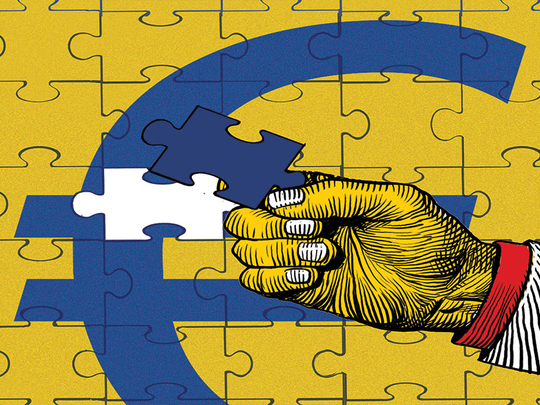
In 2014, we have commemorated the 100th anniversary of the start of First World War and the 25th anniversary of the fall of the Berlin Wall. The former led to the still greater catastrophe of the Second World War, followed by Europe’s division between the west and the communist bloc.
The latter marked the end of that division and the emergence of a Europe, whole and free. Today, we can see a great irony of history: Germany has won through peaceful means the position it sought through force of arms. Like it or not, the Federal Republic is Europe’s central power.
Some are born great, some achieve greatness, and some have greatness thrust upon them. Germany is now experiencing the last in full measure. So how is it faring with this eminence? Quite well, but not well enough.
Germany’s pre-eminence is not only a matter of its size and geographical position. Nor is it just the fruit of its manufacturing prowess. Remarkably, of Europe’s large countries Germany has arguably the most stable and adult democracy. It is free of the xenophobic populism that mars the others. In Angela Merkel, it possesses an exceptionally mature and responsible leader.
Despite these triumphs, all is not well. The Eurozone economy is mired in stagnation and ultra-low inflation. Yet many German policymakers resist efforts to change this for the better.
As a result, for far too many, the vaunted European project represents not a hope for a better life, but its opposite.
Meanwhile, to the east a revanchist Russia has destabilised a hapless Ukraine and threatens to destabilise even more of its former empire. Again, just as is the case for the economy, this challenges postwar Germany’s reflexes. It wishes to avoid a more assertive posture but can no longer do so.
The difficulty Germany finds in playing its new roles is understandable.
Germany did not seek the euro. On the contrary, it was a price others foolishly asked Germans to pay for unification. German policymakers understood the political and economic implications of a currency union. Those of almost all other would-be members did not.
Beyond that, Germany has a still bigger difficulty: the economic doctrines that underpinned its postwar success cannot be carried over unchanged to the larger and more diverse Eurozone economy. It has to reach compromises with those many Germans think of as failures.
The economic doctrines central to German conventional wisdom are those of a small open economy. Much the same is true of its geopolitics. Responsibility for securing global order rested on others: the US above all and, within Europe, on France and the UK.
In both cases, these “small country” perspectives were a natural, indeed enforced, response to the disasters that followed on Germany’s previous efforts to “achieve greatness”. But such reflexes are no longer appropriate. They have left a vacuum only Germany can fill.
On the Eurozone, the starting point has to be to see the Eurozone economy as a whole. What do we see there? Core year-on-year inflation is just 0.7 per cent. In the second quarter of 2014, nominal domestic demand was 1.7 per cent above its pre-crisis peak and real demand was 5 per cent below it.
Unemployment is 11.5 per cent of the labour force. What does this show? Quite simply: the European Central Bank is failing to fulfil its mandate.
In a recent speech, Jens Weidmann, Bundesbank president, responded to this reality, by arguing that “it is fanciful to believe that monetary policy tools can sustainably lift the growth potential of an economy”. He is right.
But monetary policy must seek to ensure the potential is used. Clearly, that is very difficult in a single currency area with huge divergences in internal competitiveness. But that merely underlines another point: the struggle for competitiveness within the Eurozone via wage cuts is not a route to widely shared prosperity. It is instead a zero-sum game.
If Germany is to be a successful hegemon, it must broaden its outlook. It will have to recognise that domestic demand matters. A widely shared German view is that without the whip of crisis, there will be no reform.
This has some truth. But there is another: countries in distress may elect governments that reject rational policy outright. That could be a greater disaster for the future of Europe. “Temper the wind to the shorn lamb” remains a sensible motto when dealing with crises.
What does that mean right now? It means that, just as Germany was right to support Mario Draghi in his efforts to eliminate the risk of a break-up in 2012, so it needs to support the ECB president in his efforts to promote demand and avoid deflation today. It means, too, that, as a creditor country, it must accept responsibility for what it finances and how.
Debt restructuring must now be on the table, starting with Greece. Ireland, similarly, should be freed of the onerous burden of bailing out the foolish foreign creditors of its banks.
Not least, it means Germany must share responsibility for post-crisis macroeconomic adjustment. The question for a wise hegemon becomes: how does my behaviour determine the stability and success of the system from which I also benefit and for which I am largely responsible?
That question arises as much in geopolitics as in economics. It falls on Germany, albeit with allies, to craft a response to Vladimir Putin’s Russia that combines the carrot of mutual benefit with the stick of deterrence. This will require Germany to take an assertive position in defending western values.
Germany is a reluctant hegemon. It is all too easy to understand that. But it is too powerful and too central to avoid its new destiny.
Upon it rests the future of a politically and economically fragile Europe. The time of thinking small is past. Germany is now a big country with big responsibilities. It will be judged by how it lives up to them.
— Financial Times












